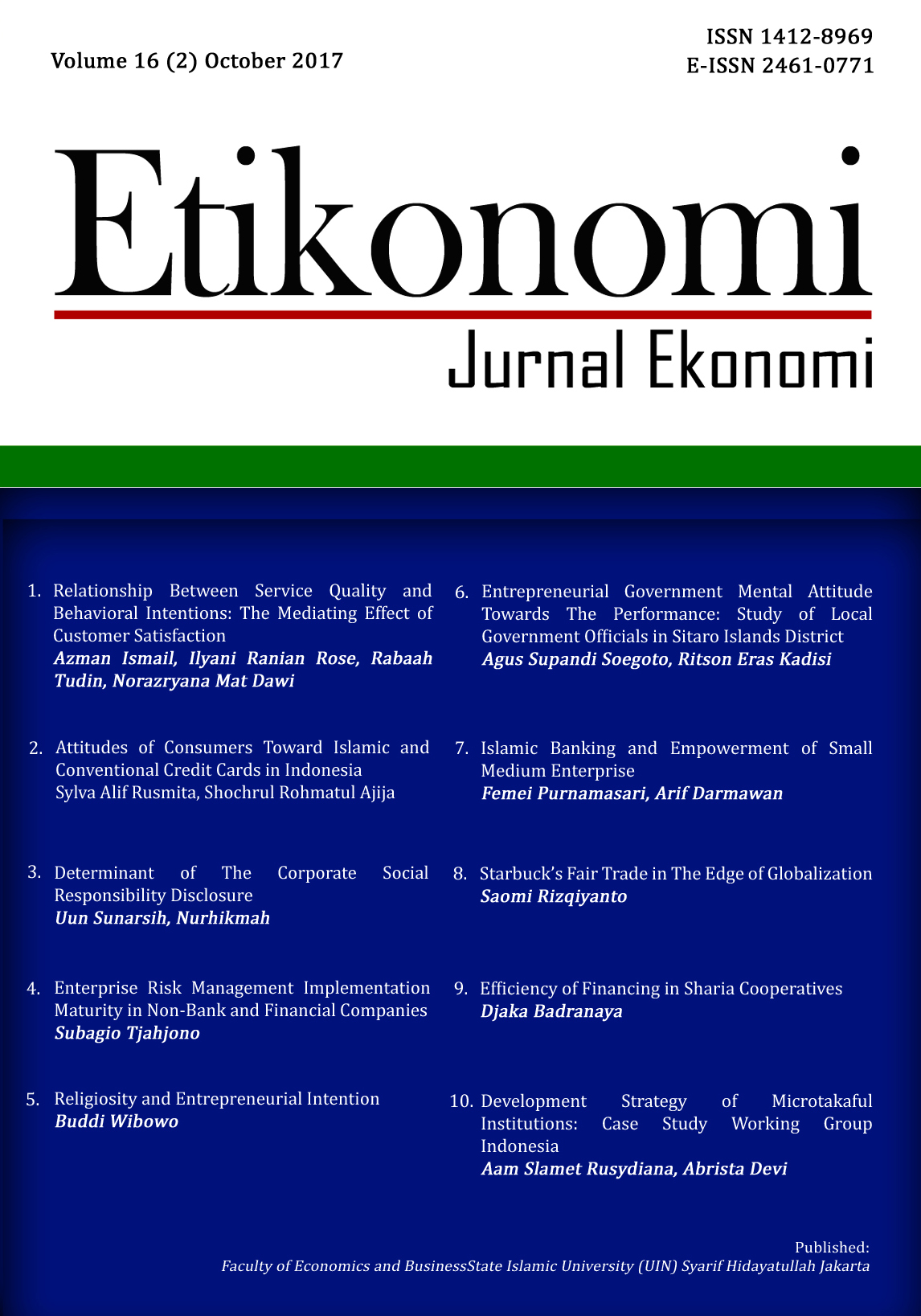Islamic Banking and Empowerment of Small Medium Enterprise
DOI:
https://doi.org/10.15408/etk.v16i2.5355Keywords:
financial institution, Islamic banking, small and medium enterpriseAbstract
This study explores the effectiveness of developing SMEs with role of Islamic Banking in Indonesia. The study also want to prove the role of Islamic banking to help SMEs in Indonesia based on data and research. Data analysis and methods that used in this study is descriptive statistical methods. Descriptive statistics will elaborate with some explanation data and can be figured by frequency distribution and center of distribution data. The result shows that development of SMEs regarding both the number of business units, employment, and financing from Islamic banking indicates a positive direction or increased significantly. In addition, the interaction between SMEs and Islamic banking is quite close relatively but need to be upgraded. The study only gives general overview and description about positive impact from Islamic banking mechanism to stimulate SMEs in Indonesia. The data and result provided still need to be discussed with more comprehensive literature and fact study on the ground.
Downloads
References
Amah, N. (2013). Bank Syariah dan UMKM Dalam Menggerakkan Roda Perekonomian Indonesia: Suatu Kajian Literatur (Islamic Bank and SMEs in Moving Indonesian Economy: A Literature Review). Assets: Jurnal Akuntansi dan Pendidikan. 2(1): 48-54.
Anggraeni, L., Puspitasari, H., El Ayubbi, S., & Wiliasih, R. (2015). Akses UMKM Terhadap Pembiayaan Mikro Syariah dan Dampaknya Terhadap Perkembangan Usaha: Kasus BMT Tadbiirul Ummah, Kabupaten Bogor (The Access of MSME towards Islamic Microfinance and Its Impact on Business Development: A Case of BMT Tadbiirul Ummah, Bogor). Jurnal al-Muzara'ah. 1(1): 56-67.
Aysan, A.F., Disli, Mustafa, Ng, Adam & Ozturk, H. (2016). Is Small the New Big? Islamic Banking for SMEs in Turkey. Economic Modelling. 54: 187-194.
Bhakti, R. T. A. (2013). Pemberdayaan UMKM Melalui Pembiayaan Dengan Prinsip Bagi Hasil Oleh Lembaga Keuangan Syariah (SMEs Empowering Through Profit-Sharing Financing by Islamic Financial Institutions). Arena Hukum. 6(1): 121-137.
Faisol. (2017). Islamic Bank Financing and It’s Impact in Small Medium Enterprise’s Performance. Etikonomi. 16 (1): 13-24.
Farook, S. (2007). On Corporate Social Responsibility of Islamic Financial Institutions. Islamic Economic Studies. 15: 1-10.
Kara, M. (2013). Konstribusi Pembiayaan Perbankan Syariah Terhadap Pengembangan Usaha Mikro, Kecil, Dan Menengah (The Contribution of Islamic Bank’s Financing to Micro, Small, and Medium Enterprise). AHKAM: Jurnal Ilmu Syariah. 13 (2): 315-322.
Lenora, B. (2008). Evaluasi Program Pemberdayaan Usaha Mikro, Kecil dan Menengah (UMKM)“Garda Emas”: Studi Kasus UMKM Penghasil Sandal Di Kecamatan Bogor Selatan (The Empowering Evaluation of Micro, Small, and Medium Enterprise (SMEs) “Garda Emas”: Case Study SMEs Sandals Producer in South Bogor). (Unpublished Bachelor Thesis). Bogor: Agricultural Bogor University.
Lin, C.Y. (1998). Success Factors of Small-and-Medium-Sized Enterprises in Taiwan: An Analysis of Cases, Journal of Small BusinessManagement.36 (4): 36-41.
Noorjaya, T. (2001). Sharia Banks as an Alternative Source of Finance for Small and Medium Enterprises in Indonesia. Jakarta: ADB Technical Assistance.
Obaidullah, M. & Khan,. (2008). Islamic Microfinance Development: Challenges and Initiatives. Jeddah: Islamic Research and Training Institute IDB.
Riwajanti, N.I. (2013). Islamic Micro Finance as an Alternative for Poverty Alleviation: A Survey. Afro Eurasian Studies. 2 (1&2): 254-271.
Seibel, H. D. (2005). Islam Microfinance in Indonesia. Working Paper. Cologne: University of Colofgne, Development Research Center.













